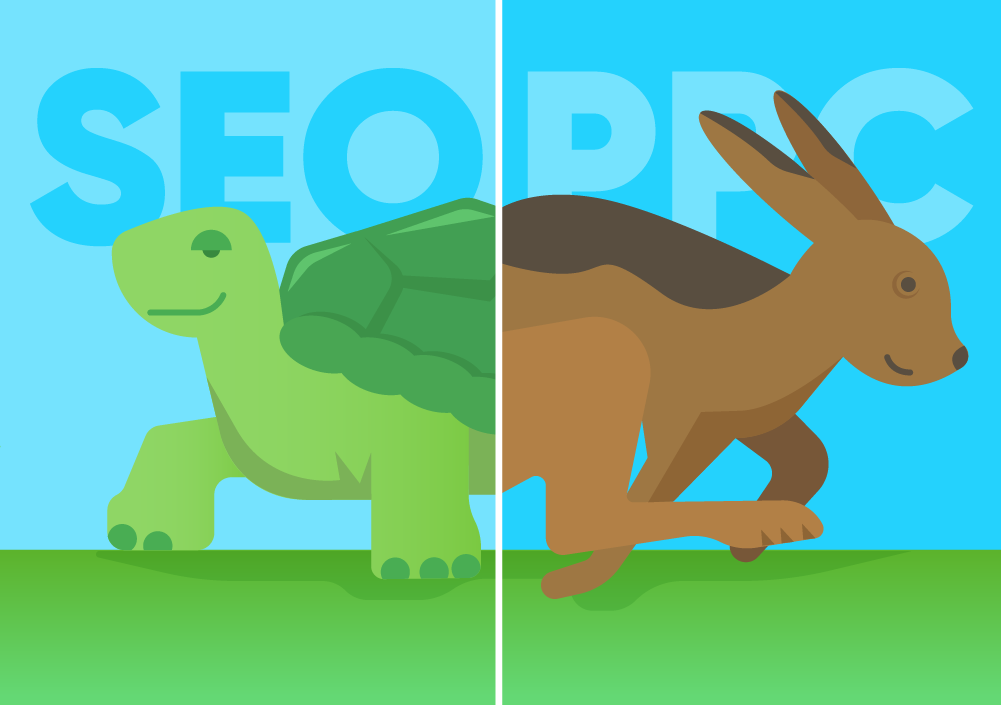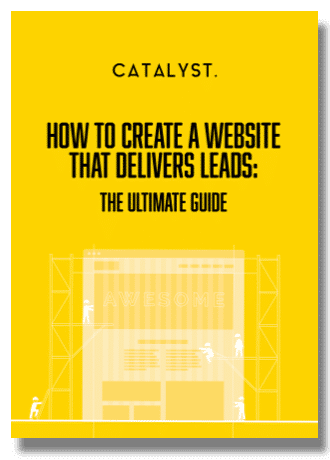While we’re asked many questions, there’s one question we get asked fairly regularly:
What’s the difference between SEO & PPC, and which is right for me?
Understandably, we work in an industry with more acronyms than you can shake a stick at. Today we’ll be running through the difference between search engine optimisation (SEO) and pay-per-click (PPC) using an analogy we’re all familiar with – the Tortoise & the Hare (can you guess which is which?).
Need more context on how SEO/PPC work? We go over this in more detail towards the end of this blog.
What’s the difference between SEO & PPC?
So, both SEO and PPC focus on getting to the top of SERPs (search engine results pages), but they do it in different ways – the Tortoise and the Hare.
SEO is our Tortoise – slow and steady wins the race.
Simply slinging keywords in might help a little, but Google prioritises high-quality content. Keywords can take a fairly long time before they take effect, and you may not immediately see results on SERPs.
This is because Google takes a while to ‘crawl’ your website (this is where they have bots find your page, see where it links, assess its keyword richness and whether it should feature on the search engine). You might begin to see results after a month or two if you’ve laid the groundwork properly.
Despite SEO taking a little time to get established, SEO converts customers at 2.4x the rate of PPC, meaning the sooner you start investing in SEO, the sooner you’ll start to benefit from it.
PPC is our Hare – Rapid results, and a brilliant place to start; every digital marketing process should include PPC as a core part of its lead generation strategy.
PPC is like a cheat code, putting you directly at the top of Google. This can be incredibly potent while you’re getting your SEO established.
It also offers the unique benefit of allowing you to target far more precisely than SEO ever could (SEO isn’t targeted at all). You can put extremely specific parameters on who can see your ad, allowing you full control over the types of clicks you’re getting.
PPC is also incredibly useful for remarketing (engaging with prospects who have already visited your website, but have bounced for whatever reason).
Finally, you can also strictly control your PPC budget, meaning you get measurable results to compare against your spend. SEO, in comparison, is a little less tangible, and a little harder to attribute its successes.
So, SEO or PPC – which is right for you?
The truth is, every successful digital marketing strategy relies on both SEO AND PPC.
While they accomplish relatively similar things, the ways in which they do it are dramatically different. The success of one directly impacts the success of the other.
Consider them two sides of the same coin. When working in tandem, they get much more done!
We recommend investing in SEO content – review your existing website for keyword density and richness, identify any gaps and create a plan on how you’re going to fill them (this might be creating blogs to fill keyword gaps, or even creating entirely new webpages).
While this process is ongoing, start setting up PPC. To do this, you’ll need:
- Defined objectives – what you want to achieve, KPIs, etc.
- A PPC account (most commonly Google Ads, but there’s also Bing Ads, Facebook Ads, LinkedIn Ads, etc., choose the platform that’s most relevant to your audience)
- Thorough keyword research – this allows you to know what you should be targeting
- Fully optimised landing pages – this is where your ads will send those who click
- Compelling ad copy – makes it much more likely that someone will click
There’s more to it than the above, but this gives you a decent starting point.
Here’s a little context, just in case you need it!
What is SEO?
Before we get stuck into the differences, we’ll give you a quick rundown of each.
SEO is the process of optimising your website content in a way that allows it to rank on search engines such as Google or Bing.
The higher you ‘rank’, the further up on the results page you’ll appear, and the more people who will click on your website.
You improve your SEO by identifying keywords that you want to rank for, and creating well-written content that prominently features those keywords. You’ll also want to feature relevant keywords throughout your website.
What is PPC?
Pay-per-click advertising is an advertising model where your business pays a fee each time one of your ads is clicked.
Usually, you’ll bid on keywords or phrases that you want your advertisement to target. When someone searches for these terms, your ad will sit above all of the organic search results.
The success of PPC is measured via click-through rate (CTR), cost per click (CPC) and return on ad spend (ROAS).
Sound like a lot?
If this all sounds like a lot of work (it is, we get it!), then it makes sense to leave it to the professionals.
You could spend hours and hours (and £1000s) learning how to successfully balance PPC and SEO, or you could pay a fraction of the price by partnering with Catalyst – PPC specialists and technical SEO agency.
Give us a shout today by clicking the link below. We’re happy to run through your needs and offer advice on everything SEO, PPC and digital marketing.


